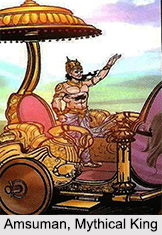 Amsuman is a mythical king of the solar race and the father of Dilipa. He was the grandson of King Sagara. His father was Asamanja, the evil son of Sagara born from his second queen Sumati. Asamanja was a wicked prince, but his son Amsuman was virtuous and much loved by everyone. Amsuman becomes the king after King Sagara"s death.
Amsuman is a mythical king of the solar race and the father of Dilipa. He was the grandson of King Sagara. His father was Asamanja, the evil son of Sagara born from his second queen Sumati. Asamanja was a wicked prince, but his son Amsuman was virtuous and much loved by everyone. Amsuman becomes the king after King Sagara"s death.
Legend of Amsuman
Once, King Sagara decided to conduct the Ashwamedha Yajna (horse sacrifice). But Lord Indra, King of Gods, was threatened by King Sagara"s growing power and so he stole the sacrificial horse and hid it in Sage Kapila"s ashram in the netherworld.
When the king discovered that the horse had been stolen, he asked his 60,000 sons to go and fetch it. The sons venture to the nether world and found the horse tied beside the meditating Sage Kapila. When they saw the horse there, they assumed that the sage was the thief and rushed at him. The sage became furious at their audacity and burnt the 60,000 sons to ashes.
When Sagara"s sons didn"t return, the king requested his grandson Amsuman to go and look for his uncles. Amsuman followed the trail through the destruction his uncles had wrought and came to the tunnel. He reached the ashram. He approaches him respectfully and apologised to the sage for his uncles" conduct. He asks about the whereabouts of his uncles. Upon being told that they were burnt to ashes, he becomes inconsolable. His uncles are unable to attain heaven.
Mollified, the sage allowed him to take the horse. Seeing that he was troubled by his uncles" fate, the sage advised him to try and bring Ganga down to earth. When her waters flowed over the ashes, he said, the sins of the princes would be washed away and they would reach heaven.
Amsuman went back to his grandfather with the horse for the sacrificial rite. He reports the sad news to Sagara who becomes grieved. King Sagara then crowned Amsuman as the king and retired to the forest in the grief of his dead sons.
Amsuman as a king, ruled over the world as far as the edge of the sea, following the footprint of his grandfather, King Sagara.









